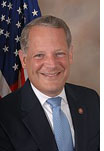|
Rep. Israel calls for ingredients to
be listed for household products
 PLAINVIEW, New York (Press Release)– On Monday, Rep Steve Israel (Democrat, New York), the Citizens Campaign for the Environment, and the Huntington Breast Cancer Action Coalition announced new legislation to protect consumers. The Household Product Labeling Act of 2009 (H.R. 3057) was introduced by Rep. Israel. PLAINVIEW, New York (Press Release)– On Monday, Rep Steve Israel (Democrat, New York), the Citizens Campaign for the Environment, and the Huntington Breast Cancer Action Coalition announced new legislation to protect consumers. The Household Product Labeling Act of 2009 (H.R. 3057) was introduced by Rep. Israel.
“We require ingredient labeling for the food we put in our mouths, but not for soap in which we wash our plates. The lack of labeling required for household products is ludicrous, it’s dangerous, and it’s due for a change,” said Rep. Steve Israel. “We have buckets and bottles full of this stuff, but no clue what’s in it. We have a right to know. The legislation I just introduced will require companies to list all ingredients for these products right on the package. This is a bill about protecting consumers, protecting our children, and keeping our homes safe.”
“Harmful chemicals are hidden within everyday household cleaning products that can cause health effects such as asthma, skin irritations, respiratory ailments and damage to the reproductive system and the nervous system. For years, companies have gotten away with putting dangerous chemicals in products by taking advantage of the lack of consumer awareness,” said Adrienne Esposito, Executive Director of Citizens Campaign for the Environment. "Families across America deserve to know if harmful chemicals are contained in products sold in grocery stores so that they can make informed, healthy choices for themselves and their families."
“Consumers are entitled to, and should expect, full and accurate labeling on any and all products they purchase. This is the first step toward minimizing the use of toxic chemicals we're exposed to every day.” said Karen Joy Miller, Director of the Huntington Breast Cancer Action Coalition.
Current federal law does not require companies to list ingredients for household products including cleaning agents, pesticides, epoxy, paint and stains. Rep. Israel’s legislation will require that companies provide a complete and accurate list of all ingredients on the product container or product packaging.
Many cleaning products contain chemicals that have been proven to be dangerous to human health. A list of examples from “Household Hazards,” a report by Women’s Voices for the Earth (2007) includes:
•Monoethanolamine (MEA) is a surfactant found in some laundry detergents, all-purpose cleaners and floor cleaners and is a known inducer of occupational asthma.
•Ammonium quaternary compounds are disinfectants found in some disinfectant sprays and toilet cleaners that have been identified as inducers of occupational asthma.
• Glycol ethers, such as 2-butoxyethanol, are solvents commonly found in glass cleaners and all-purpose spray cleaners that have been linked to reduced fertility and low birth weight in exposed mice.
• Alkylphenol ethoxylates (APEs) are surfactants found in laundry detergents, stain removers, and all-purpose cleaners, which have been found to reduce embryo survival in fish, and alter tadpole development. APEs are commonly detected as contaminants in rivers and streams – including in the Long Island Sound, and have also been found in household dust.
Phthalates are carriers for fragrance in glass cleaners, deodorizers, laundry detergents and fabric softeners, which have been l inked to adverse effects on male children, reduced sperm count in adult men, and increased allergic symptoms and asthma in children.
Go to top of right column
| |
According to a recent study by the Center for the New American Dream, the institutional cleaning industry uses an estimated five billion pounds of chemicals annually in the
United States. Children are at an increased risk for being affected by these products, as are women who make up a disproportionate amount of housekeepers and cleaning service staff.
Kohl seeks federal grant program
to assure interpreters in courts
 WASHINGTON, DC (Press Release)– Senator Herb Kohl (Democrat, Wisconsin, photo at left) introduced legislation on Monday to create a federal grant program to ensure high quality state court interpreter services are made available to non-English speakers appearing in court. Court interpreters assist non-English speakers appearing in court as litigants and witnesses. Court interpreting services vary greatly by state – some states have highly developed programs, others are trying to get programs running but lack adequate funds, and still others have no program at all. This inconsistency creates the potential for poorly translated court proceedings, or court proceedings that are not translated at all. WASHINGTON, DC (Press Release)– Senator Herb Kohl (Democrat, Wisconsin, photo at left) introduced legislation on Monday to create a federal grant program to ensure high quality state court interpreter services are made available to non-English speakers appearing in court. Court interpreters assist non-English speakers appearing in court as litigants and witnesses. Court interpreting services vary greatly by state – some states have highly developed programs, others are trying to get programs running but lack adequate funds, and still others have no program at all. This inconsistency creates the potential for poorly translated court proceedings, or court proceedings that are not translated at all.
“The shortage of qualified interpreters has become a national problem, and it has serious consequences,” Kohl said. “When interpreters are unqualified, or untrained, mistakes are made. The result is that the fundamental right to due process is too often lost in translation, and because the lawyers and judges are not interpreters, these mistakes often go unnoticed.”
Senator Kohl’s legislation addresses the shortage of qualified court interpreters by authorizing $15 million per year, over five years, for a State Court Interpreter Grant Program. This program would provide much needed assistance to states to develop, implement and improve state court interpreter certification programs in order to ensure fair trials for individuals with limited English proficiency. Those states that apply would be eligible for a $100,000 base grant allotment. In addition, $5 million would be set aside for states that demonstrate extraordinary need. The remainder of the money would be distributed on a formula basis, determined by the percentage of persons in that state over the age of five who speak a language other than English at home.
A lack of qualified interpreters can create serious problems in the justice system. For example, a poorly interpreted trial may be appealed on the grounds that justice was not administered fairly. Those appeals clog up the courts. In addition, where there are inadequate resources available, interpreters may not be able to keep up with the caseload and trials may be delayed unreasonably and in violation of a defendant’s right to a speedy trial. By increasing the pool of trained and qualified interpreters, local and federal agencies, in addition to the courts, will be able to better provide interpreter services in law enforcement, national emergency preparedness and response, immigration proceedings, human trafficking investigations, and more.
When Wisconsin’s launched its state court interpreter program in 2004, using state money and a $250,000 federal grant, certified interpreters were scarce. Since then, using that grant money, the state now has 48 certified interpreters. Most of those are certified, Spanish-language interpreters, where the greatest need exists. However, the state also has interpreters certified in sign language and German. The list of provisional interpreters – those who have received training and passed written tests – is much longer and includes individuals trained in Arabic, Hmong, Korean, Portuguese, Polish, French and Somali, among other languages.
| |

